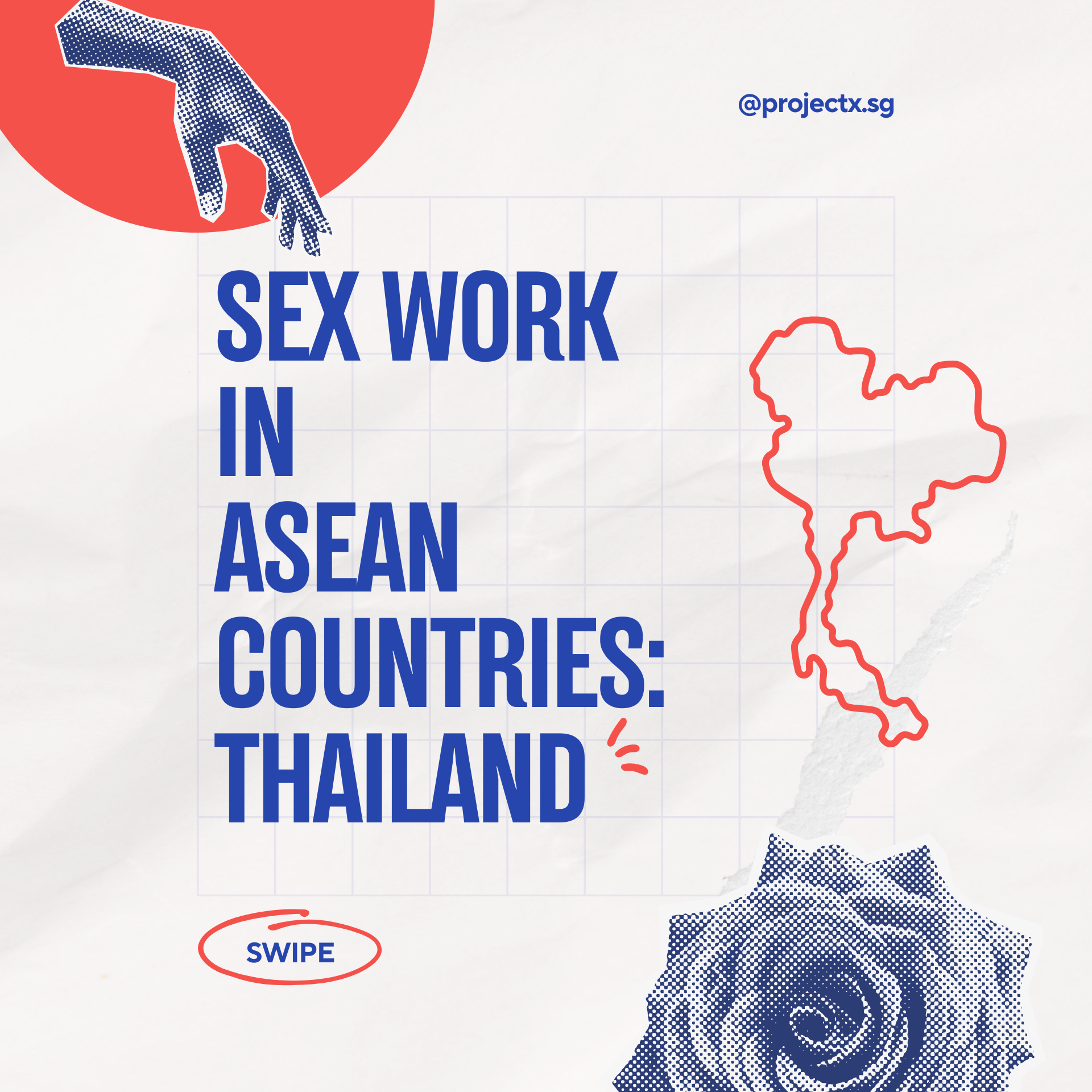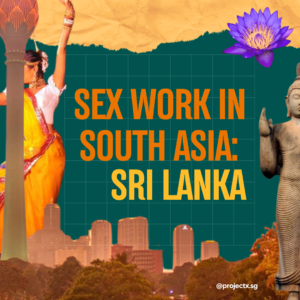Sex Work in ASEAN Nations – Thailand
Preface: This is the first post in Project X’s new series ‘Sex work in ASEAN nations’ – a series designed to encourage greater understanding of, and dispel common myths about, sex work in the region. This series will consider the state of the sex industry and sex workers rights in each of the 10 ASEAN countries. It will consider the unique historical, cultural, political and economic circumstances of that country, as well as why the decriminalisation of the industry is crucial for the region’s economic and political development.
A Brief History of Sex Work in Thailand
Sex-work has been occurring in Thailand for centuries. Historical reports of sex work existing in Thailand date back to the 1300s. The modern sex industry boomed while serving a wave of Chinese immigrants in the early 1900s, Japanese soldiers during World War II, and American soldiers during the Vietnam War.
The progressive development of the Thai sex industry from the 1970’s onwards can be attributed in part to an early temporary ‘demand shock’ caused by U.S military presence during the Vietnam War. Research shows that the spatial distribution of sex work in Thailand is tied to this historical demand. Currently, there are 5 times as many commercial sex workers in areas that were near historically former U.S bases.
But whilst red light districts may arise in certain areas to meet strong demand at a point in time, they remain active because of an ongoing demand for sexual services. Following the Vietnam War, the World Bank began to promote tourism as an engine for development, and the Thai Government began to view to sex work as an opportunity for its tourism industry. Consequently, by the 1970’s as U.S soldiers began to leave the region, they were replaced with sex tourists who continued to drive demand for sex work in Thailand.
Law, Policy, Policing
In response to the growing numbers of people engaging in sex work following the war in Vietnam, Thailand adopted the ‘Suppression of Prostitution Act 1960’, followed by the ‘Prevention and Suppression of Prostitution Act 1996’, which outlawed almost all of the activities associated with sex work and income earned from it.
Under the 1996 act, the definition of ‘prostitution’ is ‘sexual intercourse, or any other act, or the commission of any other act in order to gratify the sexual desire of another person in a promiscuous manner in return for money or any other benefit, irrespective of whether the person who accepts the act and the person who commits the act are of the same sex or not’. Under the act, persons who solicit sex ‘… in an open and shameless manner…’ (a phrase that is not clearly defined), or who are ‘… causing nuisance to the public…’ are also subject to a fine.
While sex work is (mostly) illegal, practically it’s possible for those who can afford to pay handsome bribes. Unclear laws in a system where corruption is rife, leave sex workers vulnerable to numerous forms of exploitation. Empower Foundation coordinator Thanta Laovilawayakul believes that sex workers and their employers currently pay much more in bribes to corrupt officials than they would ever pay in income tax were sex work to be legalised.
The criminalisation of sex work is an avenue through which those in a position to extract bribes (like law enforcement, government officials and politicians) can make a lot of money. This may partly explain why governments and government officials are so reluctant to legalise sex work – it is much more difficult to exploit workers who are engaged in a lawful industry and who have rights to complain and seek justice.
Sex Worker Statistics & Their Economic Impact
Whilst sex workers are a minority in Thailand’s workforce, they still make up a significant portion of all working people and they have a significant economic impact. According to a 2015 study, Thailand has around 250,000 sex workers, ranking No.8 in the global sex industry.
Estimates of sex workers’ contribution to GDP vary widely because the industry operates almost entirely underground. But in 2015, Havocscope valued it at $6.4 billion per year—about 1.5 percent of the country’s GDP that year.
Thai sex worker’s economic impact extends beyond a mere percentage point contribution to GDP. Their economic impact is significant because of the ways that Thai sex workers spend their money. Data provided by the Empower Foundation shows that 80% of sex workers in Thailand are single mothers who support other adults in the family. Consequently, it is not only sex workers who depend upon the sex industry for a livelihood, but their children and families as well. Simpkins (1998) estimates that in Thailand, 1.2 million people are financially connected to sex work in this way. This figure does not even account for ancillary industries such as hotels, bars, clubs and restaurants which indirectly depend on sex work for their economic viability.
The number of people financially connected to the sex industry, either directly or indirectly, indicates the economic dependency of a significant portion of Thai society on the sex industry. Sex work is an industry that continues to be integral to Thailand’s economic and social development, and the contributions of sex workers should be acknowledged, not condemned.
Thai Culture, Religion, and Social Norms
It’s important also to consider dominant cultural values as well as religious views in order to understand how Thai society treats sex workers. Theravada Buddhism is the dominant religion in Thailand and is practised by over 95% of Thai people. Public signs of reverence for the religion are evident throughout the country and in its culture. For many Thai people, Buddhism is thought of as ‘a way of life’ rather than simply just a religion.
The subordinate place of women in Theravada Buddhism has frequently been identified as an important factor in the rise of a large sex industry in the country. However, the impact of Buddhism on the status of women, and sex workers specifically, is oft-debated. Bishop and Robinson (1998) claim that ‘Buddhism explicitly prohibits the practice of prostitution; and Thai culture, operating within institutionalised Theravada Buddhism, most certainly stigmatises sex workers’. Steinfatt (2002) counters this argument and explains that ‘commercial sex is not condemned in Buddhist teachings, by way of its general lack of mention’. Moreover, Thai Buddhism’s emphasis on merit-making is argued to contribute to the (relative) lack of stigma faced by sex workers in Thailand as compared with other countries. Rather than being eternally perceived as ‘fallen women’ as in Judeo-Christian and Islamic traditions, sex workers can become something else later in life. They can also make merit in the present by sharing their earnings with others.
Additionally, whilst sex work in Thailand is designed to cater to foreign visitors, Thai men also frequent sex workers within the country. A majority of sex workers clients are Thai men, and the use of sexual services is quite common. In fact, around 70 percent of sex workers’ clients are Thai men and more than 70 percent of Thai men report having their first sexual experience with a Thai sex worker. Purchasing sexual services is a common form of recreation for Thai men, and large numbers of Thai women participate in the sex industry at some point in their lifetime. So, despite sex work being illegal and morally condemned by society broadly, the acceptance and use of sex workers in Thailand is actually quite mainstream.
The Hope for Law Reform
Given the above, it is logical then to contemplate the legalisation of sex work in Thailand. Sex work contributes substantially to Thailand’s economy, it is widely accepted as a practice (although it still attracts moral judgment) and millions of people are connected to the industry either as workers, consumers or as operators of ancillary businesses.
Progressive law-makers have recently introduced the ‘Sex Worker Protection Bill’ to Parliament. Whilst the exact form of the bill is still being drafted, it has already garnered support from within the sex worker community and within Parliament also. The bill is being pushed by the Department of Women’s Affairs and Family Development in a bid to undo the ‘Prostitution Suppression Act 1996’. The department has commissioned Thammasat University to prepare the content of the draft bill.
The bill has taken into account similar laws in other countries where sex work is legalised. It aims to bring the laws pertaining to sex workers into line with laws pertaining to other workers. Chatchalawan Muangjan, Empower Foundation’s legal advisor, said that once the bill is turned into law, sex workers will be entitled to the same state welfare that white-collar workers currently enjoy. It will protect sex workers from discriminatory practices and mandate that they receive proper pay. It will also establish agencies which will ensure the ongoing protection of sex workers, as well as a national level committee concerned with the regulation of sex work.
The Move Forward Party (who first submitted the draft proposal in November 2022) have pledged their support for the legalisation of sex work with party member Tunyawaj Kamolwongwat pledging his party would pass the bill if it gained power in the upcoming election. “But even if we end up in the opposition camp, we will continue pushing hard for the passage of this bill,” he said.
Thailand’s next general elections are expected to be held on the 14th May 2023, after the 25th House of Representatives reaches its four-year term limit. This next election could mark the beginning of a new era for the sex industry in Thailand and South-East Asia more broadly. If the
Coalition parties pushing the bill are able to gain more seats in the House of Representatives, the ‘Sex Worker Protection Bill’ might stand a chance at being passed and made into law. The passage of the bill would allow Thai sex workers to fully realise their human rights and allow for the national sex industry to flourish. If passed, Thailand would also be the first country in Asia to implement a fully comprehensive framework for a legalised sex industry. Thus the bill, and Thailand’s upcoming election not only have implications for the rights of Thai sex workers, but sex workers in the region.
Reference List
Achakulwisut, A. (2018) Corruption is embedded in the sex trade, https://www.bangkokpost.com. Bangkok Post. Available at: https://www.bangkokpost.com/opinion/opinion/1396586/corruption-is-embedded-in-the-sex-trade (Accessed: March 22, 2023).
Bishop, R. and Robinson, L.S. (1998) Night market: Sexual cultures and the Thai economic miracle. New York: Routledge.
Boonchalski, W. (1998) “Prostitution in Thailand,” in P. Guest (ed.) The sex sector : the economic and social bases of prostitution in Southeast Asia. Geneva: International Labour Organization.
Brodeur, A., Lekfuangfu, W.N. and Zylberberg, Y. (2017) “War, Migration and the Origins of the Thai Sex Industry.” Bonn, Germany: Institute of Labor Economics.
Keyes, C.F. (1984) “Mother or mistress but never a monk: Buddhist notions of female gender in rural Thailand,” American Ethnologist, 11(2), pp. 223–241. Available at: https://doi.org/10.1525/ae.1984.11.2.02a00010.
Manderson, L. (1992) “Public sex performances in Patpong and explorations of the edges of imagination,” Journal of Sex Research, 29(4), pp. 451–475. Available at: https://doi.org/10.1080/00224499209551662.
Narula, A. (2019) What you want to see is what you get: Realities, representations, and reputations of sex tourism in Bangkok, Engenderings. Available at: https://blogs.lse.ac.uk/gender/2019/10/24/what-you-want-to-see-is-what-you-get-realities-representations-and-reputations-of-sex-tourism-in-bangkok/ (Accessed: March 22, 2023).
Scroope, C. (2016) Thai culture – religion, Cultural Atlas. Available at: https://culturalatlas.sbs.com.au/thai-culture/thai-culture-religion (Accessed: March 22, 2023).
Sex in Grey Areas (2): How the junta threatens the lives of sex workers (2018) Prachatai English. Available at: https://prachataienglish.com/node/7540 (Accessed: March 22, 2023).
Simpkins, D. (1997) “Rethinking the Sex Industry: Thailand’s Sex Workers, the State, and Changing Cultures of Consumption,” Michigan Feminist Studies , 12.
Singh, J.P. and Hart, S.A. (2007) “Sex workers and cultural policy: Mapping the issues and actors in Thailand,” Review of Policy Research, 24(2), pp. 155–173. Available at: https://doi.org/10.1111/j.1541-1338.2007.00274.x.
Sivero, B. (2023) Thailand’s new draft law could mean better safety for sex workers, Southeast Asia Globe. Available at: https://southeastasiaglobe.com/thailand-draft-law-decriminalisation-sex-workers/ (Accessed: March 22, 2023).
Steinfatt, T.M. (2002) Working at the Bar Sex Work and health communication in Thailand. Westport, Conn: Ablex Pub.
Tdri (2022) Thailand should legalise prostitution – TDRI: Thailand Development Research Institute, TDRI. Available at: https://tdri.or.th/en/2022/07/thailand-should-legalise-prostitution/ (Accessed: March 22, 2023).
Thailand’s exploited, vulnerable sex workers could soon be protected by law (2023) Thai PBS World : The latest Thai news in English, News Headlines, World News and News Broadcasts in both Thai and English. We bring Thailand to the world. Available at: https://www.thaipbsworld.com/thailands-exploited-vulnerable-sex-workers-could-soon-be-protected-by-law/ (Accessed: March 22, 2023).
Truong, T.-D. (1990) Sex, money and morality: Prostitution and tourism in Southeast Asia. London: Zed.
Wadekar, N. (2023) In Thailand, an uphill battle to legalize sex work, The Fuller Project. Available at: https://fullerproject.org/story/in-thailand-an-uphill-battle-to-legalize-sex-work/#:~:text=But%20many%20Thais%20grew%20resentful,and%20income%20earned%20from%20it (Accessed: March 22, 2023).
Wadekar, N. (2023) Thailand is a global capital of (illegal) sex work, Foreign Policy. Available at: https://foreignpolicy.com/2023/02/15/thailand-is-a-global-capital-of-illegal-sex-work/ (Accessed: March 22, 2023).






